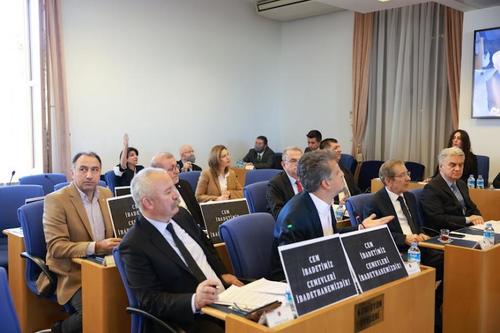A parliamentary committee yesterday (October 24) adopted a bill concerning the places of worship of Türkiye’s Alevi minority despite objections from the opposition.
The omnibus bill titled “Bill on Making Amendments in Tax Procedure Law and Some Other Laws” includes provisions authorizing municipalities and special provincial administrations for the construction and maintenance of cemevis, the places of worship.
Also, municipalities will provide drinking water or utility water to cemevis with discount or free of charge, according to the bill. Lighting expenses of cemevis will be met by the Ministry of Culture and Tourism.
The state already covers such expenses of the mosques of the Sunni majority through the Presidency of Religious Affairs.
The bill came to the parliamentary agenda after President and Justice and Development Party (AKP) Chair Recep Tayyip Erdoğan introduced a “democratization package” earlier this month.
While it addresses some of the Alevi community’s demands, it has been criticized for recognizing the cemevis as “cultural venues” rather than places of worship.
Discussions at the committee
At the Committee on Planning and Budget, the opposition MPs criticized that legislation concerning cemevis was not proposed as an individual bill, but within an omnibus bill, which has been a common practice of the two-decade rule of the AKP.
MP Bülent Kuşoğlu of the main opposition Republican People’s Party (CHP) said it was “unconstitutional.” Peoples’ Democratic Party (HDP) deputy Rıdvan Turan said it was inappropriate to address a major issue of such political and social importance through an omnibus bill.
Discrimination against MP Paylan
The HDP’s Garo Paylan, an ethnic Armenian, faced discriminatory remarks when he voiced similar objections, saying that tacklign the cemevi issue within a bundle of unrelated amendments signified an unequal treatment of citizens.
AKP deputy Uğur Aydemir accused him of “being a separatist.”
When Paylan went on to say that all houses of worship were not granted equal rights and opportunities in Turkey although all worshipers pay the same taxes, AKP deputy Cemal Öztürk told Paylan, “Why do Alevis concern you? Alevis are Muslim. You are Christian.”
Öztürk’s remark sparked a heated debate and many MP’s reacted to him while Garo Paylan addressed the Chair of the Commission and said, “Chair, look, this is pure separatism. This is pure discrimination!
Paylan later also said, talking to the ANKA news agency, “He [Öztürk] displayed a terrible act of discrimination. Above all, I am a human. I am also a democrat, and the problems Alevis have been facing because of discrimination are also my problems.”
Öztürk later said, “It disturbed me very much that he talked about Alevi belief as if it is a separate faith. Alevi belief is not a religion, it is a part of Islam.”
This approach is also opposed by Türkiye’s Alevi community, as there are Alevis who don’t identify as Muslims.
Formally unrecognized as a religious community, the Alevis were also subjected to atrocities in recent history, most notably the 1978 Maraş Massacre, the 1980 Çorum Massacre, the 1993 Sivas Massacre and the 1996 Gazi Massacre.
Their places of worship and homes are still sporadically attacked in various parts of the country, mostly by marking buildings with “X.”
In a parliamentary question last year, an MP for the Peoples’ Democratic Party (HDP) noted that 38 similar incidents took place in the country in a decade. (PE/VK)
Source:Bianet



